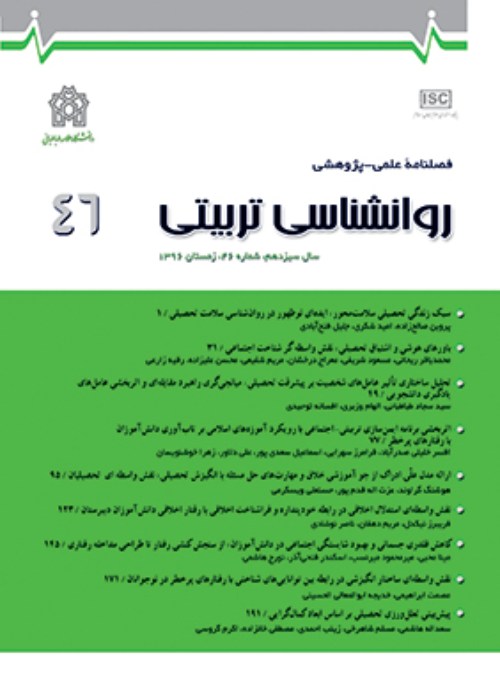The Relationship between Perfectionism and Cognitive Styles in Female High School Students in Karaj City
Author(s):
Abstract:
The aim of the research was to examine the relationship between perfectionism and multiple cognitive styles including constructive thinking, emotional coping, behavioral coping, superstitious thinking, categorical thinking, esoteric thinking, and naive optimism. In this study, 330 female high school students in Karaj were selected using multistage cluster sampling. Positive and Negative Perfectionism Scale (Terry-Short, 1995) and Constructive Thinking Inventory (Epstein and Meier, 1989) were used. The collected data were analyzed using simultaneous multiple regression procedure. Results showed a positive significant relationship between positive perfectionism and cognitive styles and a negative significant relationship between negative perfectionism and cognitive styles. In positive perfectionists, there were positive significant relationships among emotional coping with problems, behavioral coping with problems, and optimism. There was also a negative significant relationship between esoteric thinking and categorical thinking. Moreover, the relationship between constructive thinking and superstitious thinking was not significant. Negative perfectionism had negative relationships with constructive thinking and all its sub-categories. It had no significant relationship with optimism. The research findings indicated that positive perfectionists have positive thinking, are actively involved in solving their problems using behavioral and emotional methods, and have high levels of optimism and low levels of bipolar (categorical) negative thinking, superstitious thinking and esoteric thinking. On the contrary, negative perfectionists do not have positive thinking and do not use behavioral and emotional methods to overcome their problems. They have low levels of optimism; however, they keep themselves away from destructive thinking. In general, the obtained results revealed inconsistencies in the process of overcoming problems and thought patterns in negative perfectionists, whereas it revealed the use of appropriate methods in overcoming the problems in positive perfectionists.
Keywords:
Language:
Persian
Published:
Educational Psychology, Volume:9 Issue: 27, 2013
Page:
27
magiran.com/p1155546
دانلود و مطالعه متن این مقاله با یکی از روشهای زیر امکان پذیر است:
اشتراک شخصی
با عضویت و پرداخت آنلاین حق اشتراک یکساله به مبلغ 1,390,000ريال میتوانید 70 عنوان مطلب دانلود کنید!
اشتراک سازمانی
به کتابخانه دانشگاه یا محل کار خود پیشنهاد کنید تا اشتراک سازمانی این پایگاه را برای دسترسی نامحدود همه کاربران به متن مطالب تهیه نمایند!
توجه!
- حق عضویت دریافتی صرف حمایت از نشریات عضو و نگهداری، تکمیل و توسعه مگیران میشود.
- پرداخت حق اشتراک و دانلود مقالات اجازه بازنشر آن در سایر رسانههای چاپی و دیجیتال را به کاربر نمیدهد.
دسترسی سراسری کاربران دانشگاه پیام نور!
اعضای هیئت علمی و دانشجویان دانشگاه پیام نور در سراسر کشور، در صورت ثبت نام با ایمیل دانشگاهی، تا پایان فروردین ماه 1403 به مقالات سایت دسترسی خواهند داشت!
In order to view content subscription is required
Personal subscription
Subscribe magiran.com for 70 € euros via PayPal and download 70 articles during a year.
Organization subscription
Please contact us to subscribe your university or library for unlimited access!


